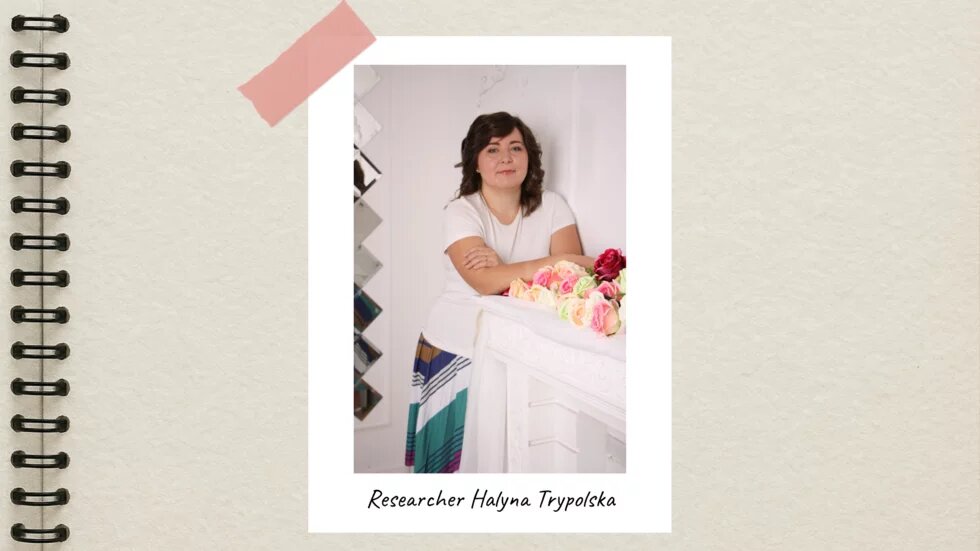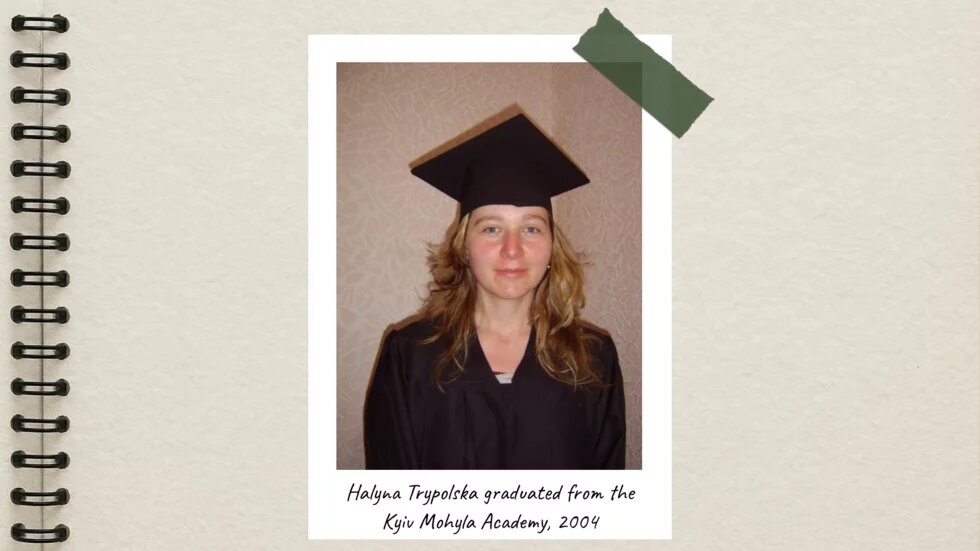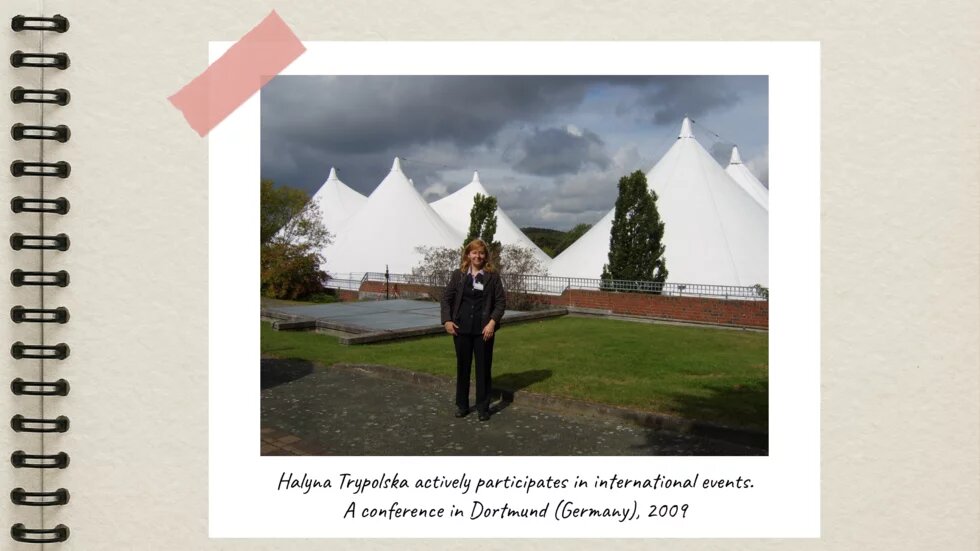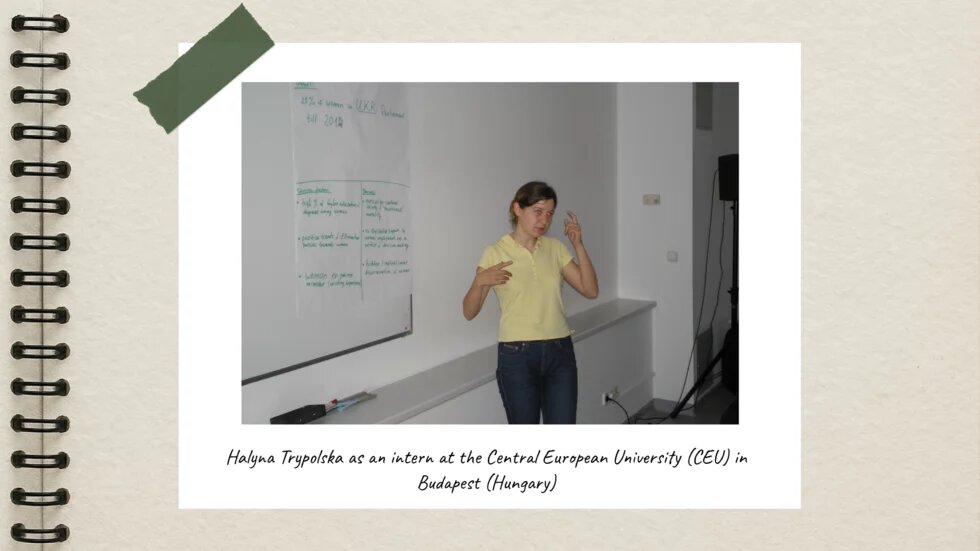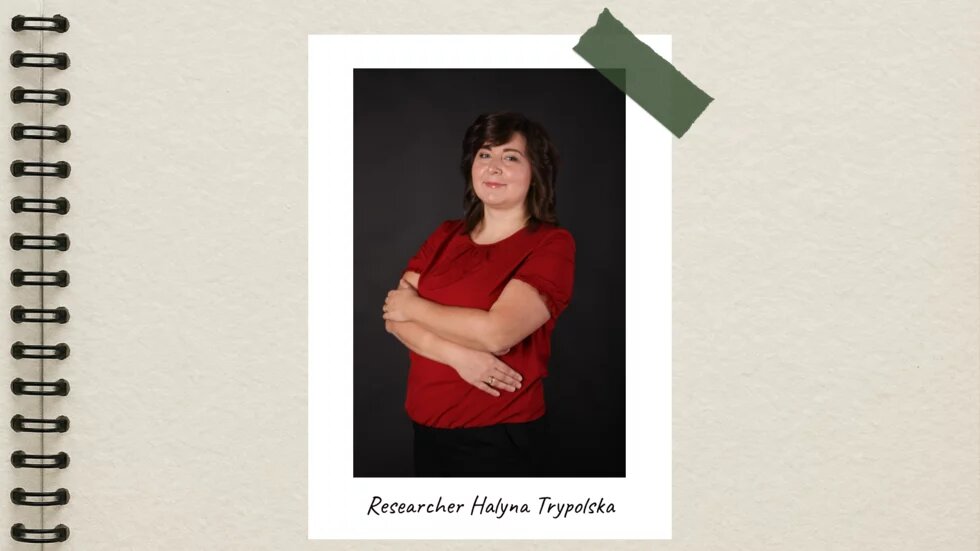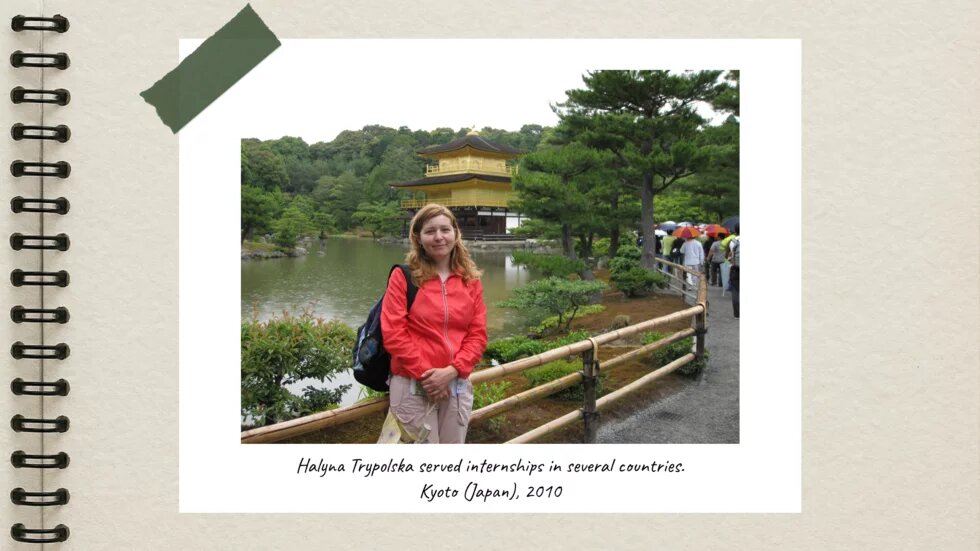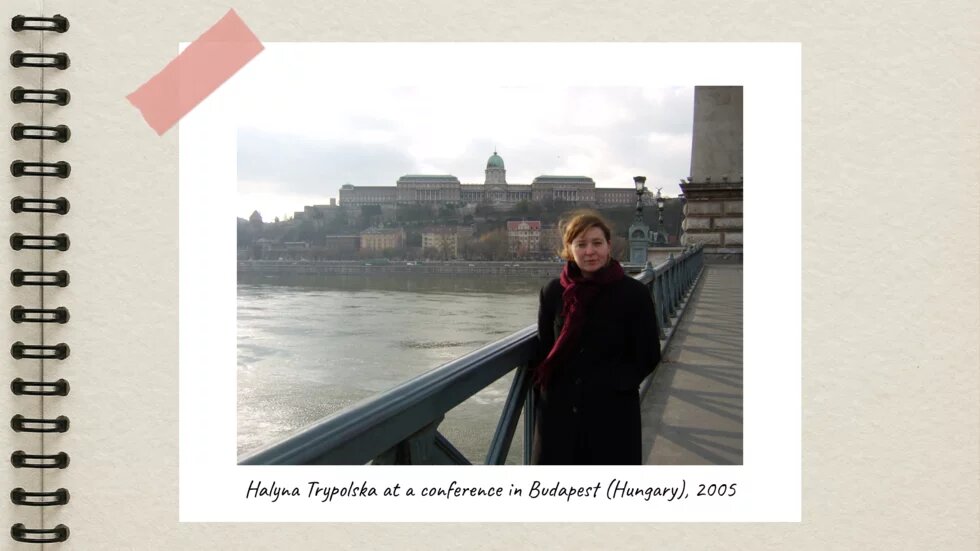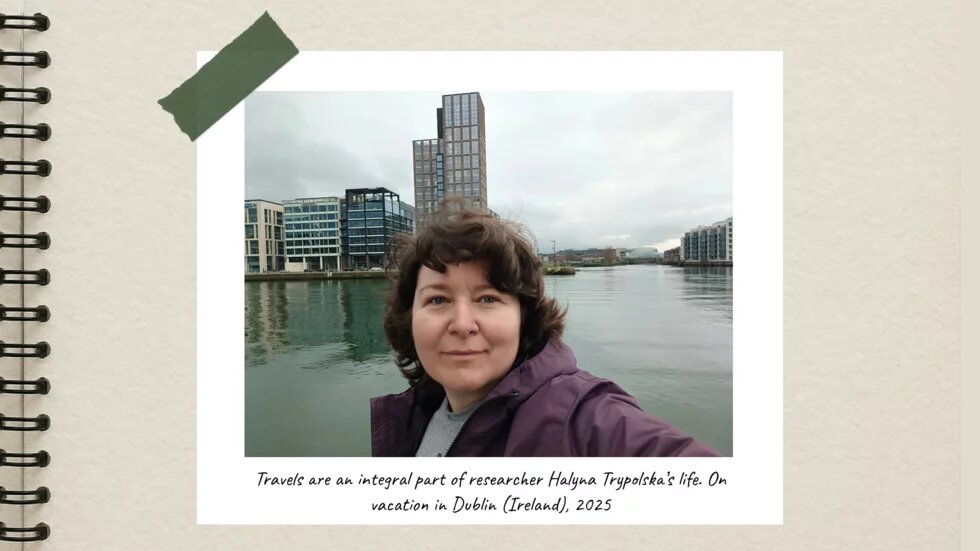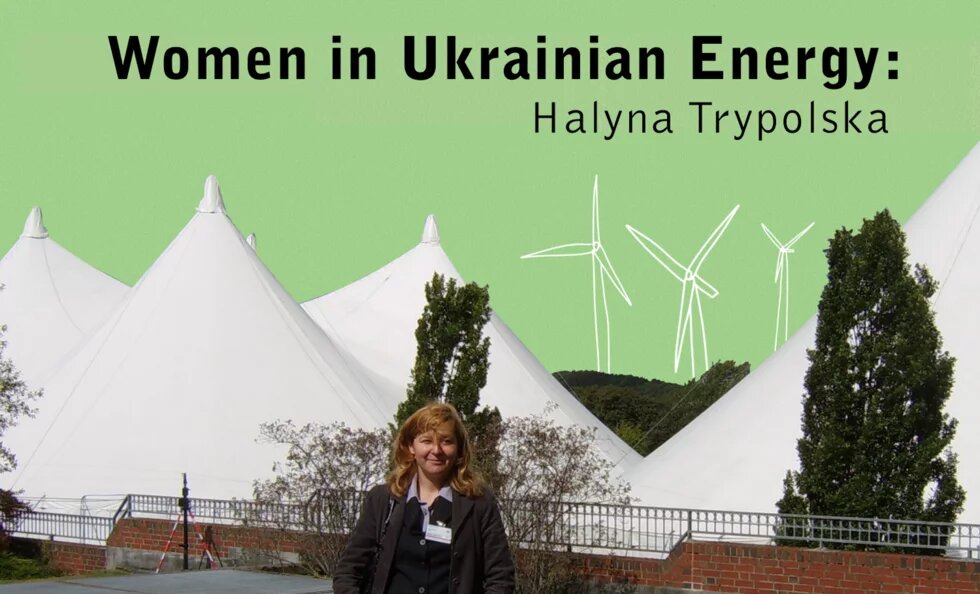
Halyna Trypolska is a researcher who has been studying energy, renewable resources, and economic pathways to mitigate climate change for over two decades. She believes that science is a calling, and that gender equality in science and energy is only possible when women are given the conditions to realize their potential. In an open conversation, Halyna shares her journey, her views on the role of women in STEM, the challenges brought by the war, and the inspiration that keeps her moving forward.
NGO Women’s Energy Club of Ukraine (WECU) and the Kyiv (Ukraine) office of the Heinrich Böll Foundation present Halyna Trypolska, a lead researcher at the National Academy of Sciences of Ukraine Institute for Economics and Forecasting. With over 110 research papers to her name over the past two decades in the field, the woman has no intention of quitting. Her area of expertise lies in renewable energy sources (RES), the economics of implementing and operating them, and their instrumental role in climate change mitigation. Over the past 10 years, Ms. Trypolska has taken on yet another line of research: the gender dimension in her field.
Halyna sat with us to share her insights on her path in research, women’s representation in what was traditionally perceived as “a man’s field”, the evolution of popular beliefs regarding gender roles, and overall life in wartime.
Ms. Trypolska, with over 20 years of professional experience under your belt, can you recall how it started? What brought you into this field?
Back then, after my fifth year at the Kyiv Mohyla Academy, I was really into tourism. So I joined an exchange programme and went to the U.S., where I worked at a hotel in southern Florida. After spending some time working with tourists, I came to believe that the customer wasn’t necessarily always right — and with such core beliefs, one has no business working in hospitality [smiling]. As for research, I’ve always been fascinated by this field.
An anecdote from my years as a student: since textbooks were scarce (and mostly foreign print), we used to borrow them and just photocopy the pages we needed. Once, I came across a theorem that lacked its proof, so I sat down and proved it on several sheets of paper. It was so easy for me, and I remember thinking, “Why didn’t they prove it in the textbook? Why not do your job properly?” And it turned out that I’d missed several pages while photocopying that chapter.
I’ve always viewed working in research as something worthwhile. Firstly, it gave me the fulfilment of following my ambition and passion for mathematics and problem-solving, and secondly, I believed I was doing something useful for the community. I have not doubted my choice since.
I believe that in research, you have to be really into it, unable to fathom an idea of doing something else for a living. You feel the calling and are simply unable not to follow it. It’s some internalised necessity.
Still, can you recall any specific occasion that convinced you that you were indeed on the right track?
Back when I was still a university student, I made some acquaintances among older colleagues from abroad. They invited me to participate in field-specific international conferences, most of them held in either Austria or the United States. So I went, time and again, and listened to what the speakers had to say, and I remember thinking, “God, that’s what I want to be doing!” I couldn’t believe that I was even invited to those events! I never felt like I was their equal, because I was just a young girl with no real-life experience. Still, I was in my element, even though sometimes I couldn’t understand what was being discussed.
You mentioned feeling like “just a young girl” among your older colleagues… Have you ever had to deal with the stereotype that you, a woman, had no business being in what was traditionally considered a “man’s field of work”?
I sure have; however, I never internalised that feeling. When I went to field-specific conferences as a post-graduate student, most of the participants were men aged 55+. In my case, however, it wasn’t so much about how those men perceived me, but rather how I perceived myself. I was somewhat suffering from imposter syndrome. But I think it’s pretty straightforward: when you see you’re not cutting it, you work hard and expand your expertise.
Imposter syndrome is the problem a lot of women still have to deal with. Any advice on how to overcome this vice?
You definitely have to expand your knowledge and your expertise. I don’t think imposter syndrome can just go away after some personal development class or something. What you need is to understand the goals that you set for yourself and head towards them. This is true for any field of work, not just the energy sector.
Was there any female mentor in your life who led you by example?
Yes, I had Ms. Tamara Ostashko, my dissertation adviser. I’m forever grateful for both her insightful advice on my PhD thesis and for her being so… full of life, all while simultaneously working on her own next thesis, and working as an expert for an international project. That was out of this world!
Also, while all our professors at Kyiv Mohyla Academy were good, some left a more profound mark. Our statistics professor Antonina Yerina, for instance, wasn’t just remarkable at teaching us statistics; she shared her personal inspiring stories.
In fact, women are likely to add some new energy and humanity to their workplace, offer an unconventional approach to problem-solving.
Over the past 10 years, have you noticed any significant shift in how women working in research and in the energy sector are perceived?
I work at an institute where gender equality has been the norm, so I haven’t seen any restrictions on creative pursuits or anything. As for the Ukrainian energy sector, there has been an increasing number of think tanks [independent organisations conducting applied research and offering recommendations on national policies, economy, social issues, foreign policy, security, etc., — Ed.] and analytical agencies headed by women, which is very good.
There’s a notable recent trend of emerging apprenticeship courses aimed at women, training, say, female solar power plant installers. What’s interesting is that I’m yet to come across a similar course in other fields of renewable energy apart from solar. This leaves a gaping hole in the workforce. Sure, women who were initially trained in, say, philology, would have to be retrained from scratch. At the same time, women with technical backgrounds would be easy to retrain, and a brief course would suffice.
Gender issues are another of your fields of interest. Where do you think a woman has more opportunities in the energy sector — in Ukraine or in other European countries?
In 2019, our institute, under the auspices of the Kyiv (Ukraine) office of the Heinrich Böll Foundation, published a research paper called “Female and Male [Employees] in the Energy Sector of Ukraine.” It revealed that back then, only 23% of employees in the energy sector were women, and I contributed to the study being conducted in Ukraine. Turns out, I was wrong. Another study, published recently by the International Energy Agency, revealed that only 20% of overall employees in the energy sector worldwide were women. I believe this is some kind of global trend, so I can’t offer a certain answer to whether the female employees have it easier in Ukraine or abroad.
Another contributing factor, in my opinion, is the generational gap. It’s no secret that in Ukraine, older folks believe that women can work wherever they want, yet expect any woman to start her “second shift” after getting home from her day job. Women are expected to do all the cooking and cleaning, provide childcare, take the kids to their extracurriculars and take sick leave when any of the children is ailing. Younger generations tend to take a different approach to sharing household chores. Life is not easy in Ukraine, nor is it easy abroad. Every place presents its own challenges and imbalances, so I wouldn’t want to demonise the situation in Ukraine.
I believe that women should be given more opportunities for professional fulfilment.
In the EU, they take a more utilitarian approach: a woman in the workforce generates more GDP than a woman out of the workforce.
The ongoing war in Ukraine presents many additional challenges for women, specifically. In your opinion, how does that affect the professional fulfilment of women, and what are the additional obstacles that female professionals have to encounter?
The war and resulting depopulation leave us with no other choice but to involve women in the workforce. What does that entail? If a woman is providing childcare, she must have available and affordable kindergartens and daycare facilities. If a woman is the primary caregiver for older relatives or a relative with a disability, she should have access to some care facilities where she would be able to leave her ward(s) for 6 to 8 hours daily. Involving more women in the workforce should not end with slogans and declarations.
And what do you think needs to be changed to involve more women in the energy sector here in Ukraine, where this field is stereotypically regarded as a “man’s work”?
I believe we should introduce some adequate qualification classes at schools, because when a girl enrols in a college to study, say, philology (which is also, without a doubt, an exciting and important field), there’s a certain probability that she’ll never get into any of the STEM specialities. However, when schoolgirls know that their options are not limited to several fields, that there are other possibilities that are open for anyone and everyone, those girls will have an easier time getting into their respective training once they graduate from school.
If we view a certain job as “men’s work” due to, say, the possible heavy lifting it entails, well, firstly, everyone’s health is deteriorating in evolutionary progression, and secondly, we’re entering the era of robotisation and artificial intelligence, which simplifies the physical toll.
Personally, I do not categorise jobs as “men’s work” and “women’s work.” For me, any job is fair game for anyone!
As someone whose job is analysing the renewable energy sector, what can you say on the jobs that can emerge, or fade into oblivion? Any advice for women planning on engaging in the field?
I believe that by and large, many mechanical jobs are bound to go obsolete, not just in the energy market. Think of when we used to rely on human cashiers to buy our groceries, and how more and more places are offering the option of self-checkout. We need to “befriend” and master the AI. I know that recent research revealed that men are more into AI than women, which is a shortcoming that needs to be eliminated.
Expertise in jurisprudence will be in demand as well, as there’s no escaping concluding contracts and resolving disputes. There will also be demand for first-line workers dealing with people, like moderators, facilitators, etc.
Learning a foreign language is crucial to having conversations in real time. Of course, now we have online translation services; however, being overly dependent on technology can be detrimental to your communication whenever you lose your phone or access to the Internet, or have some other technical issue.
What are you currently working on?
I generally deal with the economics of renewable energy, mostly in the electric power market, and to a lesser extent in the gas and biofuel markets. Renewable energy means what we call mitigation, which basically means reducing greenhouse gas emissions. At some point, it became quite obvious that while simply reducing greenhouse emissions is necessary for the planet, it’s a little too late for that to be sufficient. Climate change is already manifesting in full force, and appropriate adaptation is due.
Gender equality issues have become more pressing over the past few years, mostly due to the pressure from our international partners. While on the surface those matters might seem utterly unrelated, they are indeed closely connected. For instance, our esteemed European partners demand that every document on energy and climate change has provisions for “the gender component.”
How did Russia’s full-scale invasion of Ukraine affect your work? Did it cause a shift in the emphasis of your research?
I wouldn’t say that. I’m still doing what I was doing. Unfortunately, the issue of climate change remains as pressing as ever, regardless, war or no war. While the full-scale invasion is a tragedy affecting both my physical and mental health, however, I need to keep going.
In the early days of the full-scale invasion, I was in Ukraine. Later, I took my son and went abroad, to Poland, where we spent the next year and three months or so. We were allowed to work remotely. We had to wait until the second school year was over, and then we returned home. I’ve been working for this institute for over 20 years now, so my returning home hasn’t changed a thing in my career.
How important was the ability to work remotely for the Ukrainian women who fled the war by going abroad?
As Ella Libanova, a respected academician, puts it: whenever a job can be done remotely, the employee should be given such an option... Of course, if your finances allow you to live abroad and provide for yourself while there’s an ongoing war. I mean, a woman will continue with her work for a better future for Ukraine, and the employer won’t be pressed to replace her with a new hire. This arrangement is good for the employee, too, as they know they have a place to return to.
In this regard, the National Academy of Sciences of Ukraine was very wise to allow its employees to work remotely.
Do you have any professional deformation, and do you tend to bring your job into your personal life?
Sure. Whenever I get to go abroad, even for a vacation, I make sure to study their energy system, the peculiarities of their electric wiring, their energy balance, so I guess I do bring my job into my personal life [smiling].
Gender issues are also of great interest and concern to me. For instance, when walking down the street, I always take notice of whether there are any dads with strollers or dads accompanying their kids. I never miss an opportunity to ask how many leaves of absence are offered to fathers so that they can tend to their sick children. I once went to visit my friend, a Ukrainian woman long married to a Spanish man, since before the war. While staying at their place, I asked them a lot of questions about how they share domestic chores and which spouse had what areas of responsibility.
Do you mind me asking how you share the chores in your family?
Well, you never can tell. I think that some major aspects regarding the child’s health are still expected to be taken care of by women, which, to me, is weird, as not every woman has had medical training.
Many women struggle to find the balance between their career and their personal life. Have you managed to find it?
As they used to say, we all come from childhood. I believe that we all come from our personal lives, so it’s not like we can completely separate our jobs from our personal lives. When all is well at home, you are more productive at your workplace, and overall, you’re doing fine. While I can’t say I have everything super balanced, desperate times call for desperate measures. Still, I try to do my best, with varying degrees of success.
Do you have a hobby that helps you shift your focus from your job and recover?
I love travelling and swimming. I’m not a good swimmer, but it’s OK as long as I get to be in the water. Travels, on the other hand, help me change my surroundings, relax, and clear my mind of any unnecessary thoughts. That’s when the good ideas tend to come. And then, whoosh, I’ve finished a new article in just three hours.
I believe one must have some kind of hobby, especially in times when it’s crucial to have something that keeps you grounded.
Which countries have you been to?
Oh, plenty! I’ve travelled to almost every country in Europe (except for Switzerland), spent some time living in the United States, went on a long internship in Japan, and been to Canada several times… While we’re on it, my job is very helpful in this regard, as I get to attend a lot of international conferences. That part was actually one of the key factors why I got into research.
Given your experience in travelling and participating in international events, what do you think Ukraine should borrow from other nations when it comes to gender balance and women’s economic empowerment?
In fact, Ukraine’s legislation on gender balance is pretty decent, although its implementation is lacking. We need to explore every possible way to relieve our women of all those numerous household chores, and this is where I believe the experience of other European nations comes in really handy. We need more awareness campaigns to demonstrate how unequally the burdens of caregiving are distributed in Ukraine compared to other nations. While we don’t necessarily need to copy their practices to a T, we need to correct the “alignment errors” that we have. Other countries have their own “alignment errors”, like the abortion ban in Poland, right?
While we don’t have any formal restrictions preventing women from holding a certain position in a certain field, we do need awareness campaigns to drive home that no career is a “men-only” or “women-only” path.
As the winner of last year’s Women in Ukrainian Energy competition, how important are such awards for women?
This is a matter of utmost importance! Because women are so underrepresented, those awards allow us to shed some light on this problem. Therefore, I believe that having such contests is surely a good and useful thing, so I’m grateful to the Women's Energy Club of Ukraine for the opportunity!
NGO Women’s Energy Club of Ukraine (WECU) is an independent professional association for the female employees of Ukraine’s energy sector, based on voluntary participation.
The club unites over 200 women, including energy experts, employees of members’ organisations and Ukrainian branches of international organisations reforming Ukraine’s energy sector, businesses, NGOs, female Members of Parliament (MPs), and any women interested in fair and sustainable development of the Ukrainian energy sector.
WECU initiated the annual Women in Ukrainian Energy competition in 2019.
The goal of the contest is to recognise women’s achievements in the energy sector, bolster their role in the field, and encourage them towards further achievements, both in the energy sector and related fields. The award is meant to encourage participants to promote gender equality in the energy sector, in their workplace, professional training, research, and field-specific journalism.
The nominations for this Competition are determined annually. Over the past years, they included Business of the Year, Female Executive of the Year, Female Employee of the Year, Female Journalist of the Year, Female Educator of the year, Female Decarbonisation Leader, Female Politician of the Year, Female Volunteer of the Year, and Female Lawyer of the Year.
The contest is held under the auspices of the Heinrich Böll Foundation, Kyiv Office - Ukraine.
